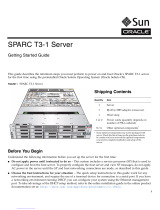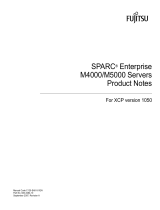Page is loading ...

This guide describes the minimum steps you must perform to get your server to power on and boot for the first time
using the preinstalled Solaris™ Operating System (Solaris OS).
FIGURE 1 SPARC Enterprise T5140 Server
Shipping Contents
Quick Setup Instructions
For quick installation and configuration, follow these steps. For more detailed information, refer to the complete online
product documentation set at: http://www.fujitsu.com/sparcenterprise/manual/
Understand the following information before you set up the server for the first time:
■ Choose the best instructions for your situation – These quick setup instructions work for any networking
environment, and require the use of a terminal device for connectivity to a serial port. If you have a networking
environment running DHCP, you can configure your system using the Ethernet management port. To take advantage
of DHCP setup method, refer to the online installation guide instead of these instructions.
■ Set aside sufficient time – Installation times vary, but if you are performing these setup instructions for the first time,
plan to spend about 45 to 75 minutes to complete all of these instructions. Additional time might be required for
installing optional hardware and rackmounting kits.
■ Gather your configuration information – During the configuration, you are prompted for time zone and networking
parameters that are specific to your environment. For a list of information you need, see Step 9.
■ Obtain a terminal device – You configure this rackmountable server through the service processor (SP) using the
built-in serial and network management ports, and not through a graphical interface and keyboard. For more
information about the terminal device, see Step 3.
■ Do not apply power at this time – This system includes a service processor (SP) that is used to configure and boot the
main host server. To properly configure the host server and view SP messages, do not apply AC power to the server
until the SP and host networking connections are made, as described in this guide.
Quantity Item
1Server
2 RJ-45 Ethernet cable
1 RJ-45 to DB-25 adapter (crossover)
1 RJ-45 to DB-9 adapter (crossover)
1Wrist strap
2 Power cords (packaged separately)
1 Rackmounting kit with cable
management assembly
SPARC
®
Enterprise T5140 Server Getting Started Guide
SPARC
®
Enterprise T5140 サーバ はじめにお読みく ださい

1. Unpack the server, and check that you received all of the shipping contents.
2. Place the server in its intended location for verification.
For rackmounting instructions, refer to the instructions included with the rail kit, the service label on the server, and
to the online SPARC Enterprise T5140 and T5240 Servers Installation Guide.
3. Connect a serial cable between the server’s SER MGT port (
FIGURE 2) and a terminal device.
This connection provides your initial communication with the service processor (SP).
The terminal device can be a terminal, a terminal server, or a laptop with terminal emulation software running. The
device must be set up to communicate using 9600 baud, 8 bit, no parity, 1 stop bit. A null modem configuration is
needed, meaning the transmit and receive signals are reversed (crossed over) for DTE to DTE communications. You
can use the supplied RJ-45 crossover adapters with a standard RJ-45 cable to achieve the null modem configuration.
FIGURE 2 Server Connections
4. (Optional) Connect an Ethernet cable between the server’s Net MGT port (FIGURE 2) and the network to which
future connections to the SP and host will be made.
After the initial configuration of the system using the SP SER MGT port, communication with the SP and host is
usually performed through this Ethernet interface.
5. Connect an Ethernet cable between one of the server’s NET ports (
FIGURE 2) and the network to which the server
will communicate.
6. Plug the power cords into the power supplies and into a power source.
Note - Only one power connection is required for operation. Use two power connections for redundancy.
When power is applied, the SP initializes and power supply LEDs illuminate. After a few minutes, the SP login
prompt appears on the terminal device. The host is not initialized or powered on yet.
Numbered cables
correspond to setup steps.
n
(Optional)

7. At the terminal device, log in to the SP as root with a password of changeme.
After a brief delay, the SP prompt is displayed (->). At this point, there are many commands you can perform using
the Integrated Lights Out Manager interface.
Additional SP information, such as how to change the password and how to set up the SP network parameters is
available in the online documentation set.
8. Power on the server and redirect the host output to display on the serial terminal device:
After you start the SP console, the server initialization takes approximately 20 minutes to complete.
9. When prompted, follow the onscreen instructions and enter the following configuration information.
You will be prompted to confirm the configuration several times, enabling confirmation and changes. If you are not
sure how to respond to a particular value, you can accept the default, and make future changes when the Solaris OS
is running.
When the configuration menus are completed, the server reboots and displays the Solaris login prompt.
SUNSP00144FAC732F login: root
Password: changeme
. . .
->
-> start /SYS
Are you sure you want to start /SYS (y/n)? y
-> start /SP/console
Are you sure you want to start /SP/CONSOLE (y/n)? y
Serial console started. To stop, type #.
. . .
Parameter Description
Language Select a number from the displayed language list.
Locale Select a number from the displayed locale list.
Terminal Type Select a terminal type that corresponds with your terminal device.
Network? Select Yes.
Multiple Network Interfaces Select the network interfaces that you plan to configure. If you are not sure, select the first
one in the list.
DHCP? Select Yes or No according to your network environment.
Host Name Enter the host name for the server.
IP Address Enter the IP address for this Ethernet interface.
Subnet? Select Yes or No according to your network environment.
Subnet Netmask (If subnet was Yes) Enter the netmask for the subnet for your network environment.
IPv6? Specify whether or not to use IPv6. If you are not sure, select No to configure the Ethernet
interface for IPv4.
Security Policy Select either standard UNIX security (No) or Kerberos Security (Yes). If you are not sure,
select No.
Confirm Review the onscreen information and change it if needed. Otherwise, continue.
Name Service Select the name service according to your network environment.
Note–If you select a name service other than None, you will be prompted for additional name
service configuration information.
NFSv4 Domain Name Select the type of domain name configuration according to your environment. If you are not
sure, select Use the NFSv4 domain derived by the system.
Time Zone (Continent) Select your continent.
Time Zone (Country or Region) Select your country or region.
Time Zone Select the time zone.
Date and Time Accept the default date and time or change the values.
root Password Enter the root password twice. This password is for the superuser account for the Solaris OS
on this server. This password is not the SP password.

Manual Code C120-E488-01XA
Part No. 875-4326-10
February 2008, Revision A
10. Log in to the server and explore the capabilities.
There are many commands you can use to verify the functionality of the system. The following list describes a few of
them:
■ showrev – Displays the hostname and system architecture information. Use the -a option with this command to
see the patches that are installed.
■ psrinfo – Displays information about the number and status of the processors and cores in the host.
■ prtdiag – Displays system configuration and diagnostic information.
Review the Solaris OS man pages and documentation for more details.
Accessing Important Information for SPARC Enterprise Series Servers
Before you deploy your server, check for the Product Notes for your server and other important information on the
following websites.
Global Site
http://www.fujitsu.com/sparcenterprise/manual/notes/
North American Site
https://download.computers.us.fujitsu.com/
Japanese Site
http://primeserver.fujitsu.com/sparcenterprise/manual/notes/
Accessing Documentation
The following websites provide the latest versions of SPARC Enterprise Series manuals:
Global Site
http://www.fujitsu.com/sparcenterprise/manual/
North American Site
https://download.computers.us.fujitsu.com/
Japanese Site
http://primeserver.fujitsu.com/sparcenterprise/manual/
Reader's Comments Regarding This Manual
If you have any comments or requests regarding this manual, or if you find any unclear statements in the manual, please
state your points specifically, and forward it to the system engineer (SE) in charge, or your sales representative.
Copyright 2008 Sun Microsystems, Inc. All rights reserved. FUJITSU LIMITED provided technical input and review on portions of this material.
Copyright 2008 Sun Microsystems, Inc. Tous droits réservés. Entrée et revue tecnical fournies par FUJITSU LIMITED sur des parties de ce matériel.


Manual Code C120-E488-01XA
Part No. 875-4326-10
2008 年 2 月 , Revision A
Copyright 2008 Sun Microsystems, Inc. All rights reserved. FUJITSU LIMITED provided technical input and review on portions of this material.
Copyright 2008 Sun Microsystems, Inc. Tous droits réservés. Entrée et revue tecnical fournies par FUJITSU LIMITED sur des parties de ce matériel.
/



